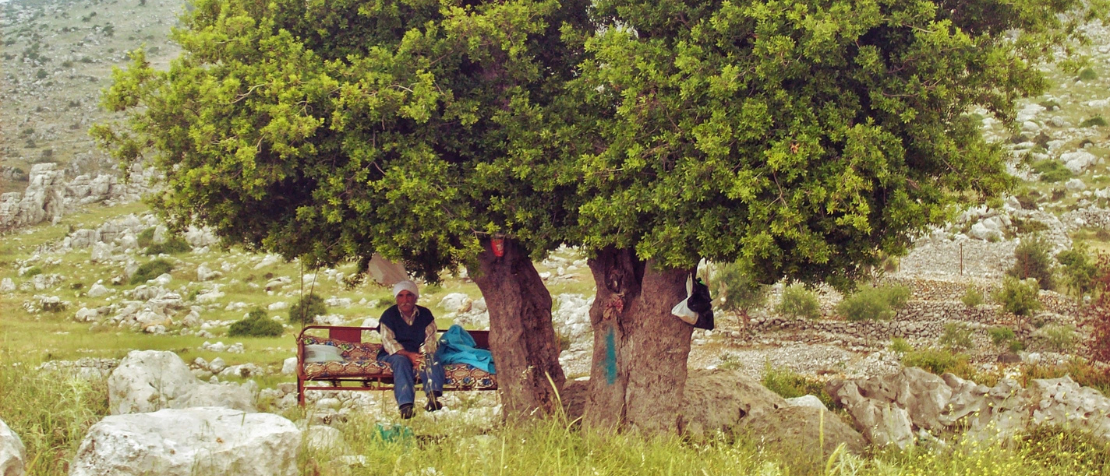Greater restoration efforts needed for Mediterranean forests
8th Mediterranean Forest Week takes place in Spain

©FAO/Patricia Sfeir
New approaches and strengthened collaboration on restoration are needed to ensure that the Mediterranean’s forest ecosystems thrive, experts from the region will hear this week as they gather for the 8th Mediterranean Forest Week (8MFW) in Barcelona, Spain.
The week, entitled “Working together for sustainable and resilient Mediterranean forests – Towards a collaborative roadmap”, is organized by the Food and Agriculture Organization of the United Nations (FAO), the European Forest Institute Mediterranean Facility (EFIMED) and the Joint Organizing Committee.
Government representatives, agencies, forest stakeholders and researchers will discuss the most pressing issues forest ecosystems are facing in the Mediterranean with a focus on the strategic role of restoring degraded forest landscapes to adapt to the impacts of climate change. Emphasis will be placed on resilience, biodiversity, youth engagement, and sustainable management practices.
The week runs in parallel with the 25th session of the Committee on Mediterranean Forestry Questions - Silva Mediterranea, a statutory body of FAO that plays a pivotal role in decision-making and fostering cooperation and sustainable forest management in the region.
“Strengthened collaboration, innovative solutions for long-term forest restoration strategies and sustainable practices are vital to increase the resilience of Mediterranean forests to the effects of global changes,” said Zhimin Wu, Director of FAO’s Forestry Division.
Towards a collaborative roadmap
Mediterranean forests cover about 10 percent of the total area of Mediterranean countries and are home to almost 25 000 native plant species. They are a vital source of forest foods, renewable biomaterials and energy, and incomes for local communities. They also provide ecosystem services from regulating water cycles and enriching soil to reducing the risks and impacts of extreme weather and natural disasters.
But pressure has grown on forest ecosystems in this region from human activity and climate change. Wildfires in particular are devastating the region’s fragile ecosystems, with more than 400 000 hectares burned annually. At the same time, at least 16 percent of animal and plant species in Mediterranean forests are threatened with extinction due to global threats such as climate change.
As a conclusion of the week, a high-level session will address ideas for countering the escalating threats from factors such as droughts, floods and wildfires through a new Mediterranean Forest Initiative. Building on the current efforts and institutional frameworks in the region – like Silva Mediterranea – the initiative would promote an enlarged partnership among Mediterranean actors and new approaches aiming to preserve and restore the region’s forest landscapes at scale.
Delegates are expected to discuss and agree on the principles and a roadmap for establishing the initiative, which would run for ten years from the end of 2025.
Mediterranean Youth Task Force
The 8th Mediterranean Forest Week will also offer an opportunity and platform to promote youth exchanges, facilitated through the recently established Mediterranean Youth Task Force, which represents the youth network of Silva Mediterranea.
Mediterranean youth is essential in the forestry sector and in forest-based value chains, but young people still face challenges such as unemployment, lack of financial opportunities and lack of inclusion and participation in local and international decision-making.
The Mediterranean Forest Week aims to provide a space where young foresters can interact, learn and exchange, ensuring youth participation and action in the forest sector while promoting intergenerational exchanges. A dialogue focused on Youth Action Towards Sustainable Management of Forest Ecosystems will highlight the expertise and knowledge of young experts and discuss pathways for enhanced youth engagement and empowerment. The outcomes of this dialogue will contribute to the global Youth Roadmap on Forestry.
The week will also offer various plenary sessions, side events, poster sessions, field visits, debates and discussions to highlight restoration efforts in the region under global commitments and initiatives such as the UN Decade on Ecosystem Restoration and the Bonn Challenge.
A Spanish issue of FAO’s flagship forestry journal, Unasylva, on the restoration of Mediterranean forests will also be launched.
Aligned with the topic of the eight Mediterranean Forest Week, earlier this year, the Mediterranean region – represented by Lebanon, Morocco, Tunisia and Türkiye – was recognized as a UN World Restoration Flagship by the UN Decade on Ecosystem Restoration.
